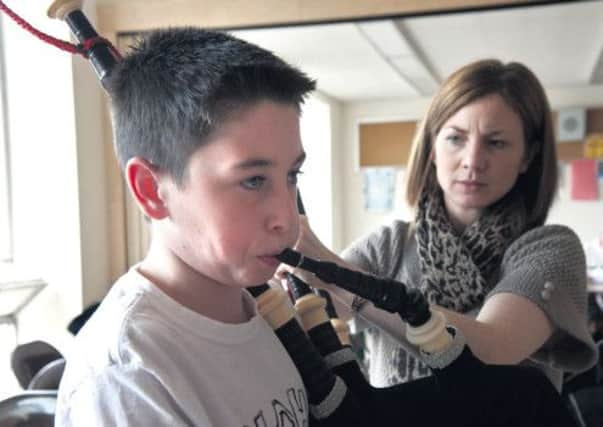Scots schools lack lessons in traditional music


The figures come despite growing interest in the traditional music world from festivals such as Celtic Connections and last year’s Disney-Pixar film Brave, whose soundtrack featured Scottish musicians including Julie Fowlis.
However, a report produced by Roddy MacLeod, principal of the National Piping Centre, states that only 6.5 per cent of all instrumental music taught in Scottish schools is on traditional instruments, which include bagpipes, clarsach, fiddle and accordion, with only one bagpipe teacher per 20,000 students in primary and secondary schools.
Advertisement
Hide AdMacLeod’s survey also showed there are only 2.5 bagpipe teachers available in major cities including Glasgow, Dundee, and Aberdeen, while Edinburgh schools provide none.
MacLeod said: “There is a severe lack of core provision of traditional music teaching in Scotland. Our findings show that only 6.5 per cent of all music provision related to traditional music. We know from our experiences of making presentations to school children that we get a tremendous response and interest in learning to play the pipes, but for most children in Scotland their school does not provide the opportunity.”
The figures show that traditional music is severely under-represented compared with other instruments, with 20.14 per cent of all instrumental teaching being in strings, 19.32 per cent woodwind and 18.97 per cent brass. Only 4.58 per cent is in bagpipes, and when Highland Council is stripped out, that figure falls to 2.91 per cent.
MacLeod added: “It’s shocking to think that there is only one bagpipe teacher for every 10,000 children in secondary education in Scotland. It’s pretty poor. And the fact that the capital city doesn’t even employ one bagpipe instructor for the whole city means that kids in Edinburgh just don’t get the opportunity to learn the pipes unless they go to a private school or pay for private lessons. There is a huge disparity between what traditional music provision there is, and the opportunities it should have to flourish.”
Folk musician Karine Polwart said that traditional music in Scotland could be threatened by the current situation.
She said: “There is neither a lack of demand nor a lack of qualified teaching staff in traditional music, there is just a lack of priority given to these instruments, and that’s a great pity. There is a lack of imagination in giving children cheap and accessible ways to access music.
Advertisement
Hide Ad“Traditional music is thriving, but it’s thriving among people with money. There is a big demand for it and some massively popular traditional music movements, but a lot of kids are excluded because there are costs to meet. There is a lack of access for kids who don’t have much money. It would become a great shame if traditional music – originally the preserve of the working classes – became a middle-class preserve. Something would be lost by that.”
The survey comes after Scotland on Sunday launched its Let the Children Play campaign last September, which is campaigning for instrumental tuition fees in schools to be scrapped. Since the launch of the campaign, which revealed that children are being charged between £95 and £340 a year for instrumental music lessons and five local authorities were charging children sitting SQA music exams, the Scottish Government has pledged to “get a grip” on instrumental music tuition and has set up an instrumental music working group to examine the issue. It has also created a £1 million instrument fund for schools.
Advertisement
Hide AdMeanwhile, two local authorities have dropped charging for SQA students, while one – Dumfries and Galloway – has abolished instrumental music charges altogether.
A Scottish Government spokesman said: “The provision of instrumental music opportunities, including traditional music, is the responsibility of local authorities. The Scottish Government has set up a group chaired by David Green – former chairman of the Cairngorms National Park Authority – to look at provision and policies for instrumental music tuition services across the country.
“This group started work in January and is due to make recommendations later this year to provide greater clarity, transparency and fairness in the delivery of instrumental music services.”
A spokesman for Creative Scotland said the body provided significant support to traditional music.
“Examples of the ways in which we work to ensure traditional music remains an exciting, vibrant part of the Scottish cultural landscape include our funding each year for the world renowned Celtic Connections, and the Hebridean Celtic Festival.
“We provide funding to a range of organisations working in traditional music including Fèis Rois, Feisean nan Gaidheal, as well as venues such as An Lanntair and Taigh Chearsabhagh.”
Scotland also plays host to the Scottish Traditional Music Awards, as well as Tradfest, a new festival running inEdinburgh.